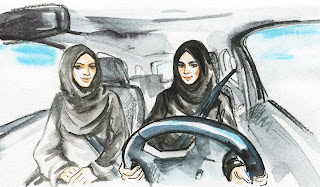Rule of Law, Equality and Discrimination and Islamophobia August 2018
Martin Luther King Jr once wrote in Strive Toward Freedom (1958), "True peace is not merely the absence of tension; it is the presence of justice."
In the United Kingdom this summer, in the months of July and August, there has been a tremendous heat wave tearing through the nation and another wave has also been affecting the people of the nation - a wave of racism, bigotry and discrimination.
Not only has there been a rise in temperature to 34 degrees Celsius, there has been a rise of anti-immigrant organisations campaigning for colonialist rights long-gone, with far-right radicalist ideologies. The problems people have with different cultures and faiths stems from self-hatred and ignorance, which then is expressed externally, to incite bullying, racial dominancy and a social self-interest. Organisations like, Neo-Nazism, Britain First, UKIP and National Front.
In France (2011) and now Denmark (2018) as well as 7 other EU countries including Holland, Belgium and Austria, there have been laws implemented saying something similar to, "face-covering in public is prohibited."
With the plight of migrants from Middle Eastern countries this is extremely ill-timed and although there are a small amount of people who wear the Burqa and Niqab which are traditional Muslim forms of attire covering parts of the face, these laws implicate from a moral standpoint far worse because 'the rule of law' is being hugely undermined.
The idea behind ‘face-covering law’ was to create social integration, however by implicating Muslim women especially, it does just the reverse. It ostracises Muslim women who have by culture and faith understood to wear certain types of traditional dress, like the Burqa and Niqab, when 'out and about' in public.
Motivations behind the law are however contradictory, prejudice and unequal, which do not apply to all people, in spite of wordings saying the "rule applies to all people," the timings of the law itself and the social context for the law, demonstrates a different and more sinister message.
If countries and governments want to protect their people, they must protect and represent all people in a country equally and speak for all people. They should be able to apply anti-terrorist measures and anti-extremist values through charitable organisations helping counter-act ideologies encouraging terror. Yet, terrorism is not just from Islamic extremists, this is far-right radicalist jibe and propaganda.
Boris Johnson made immature comments recently regarding traditional Muslim dress (Daily Telegraph 6 August), and by showing signs of xenophobia he has encouraged racial bullying. Despite his article saying explicitly, there should be no law against wearing such garments like Burqa and Niqab, his personal distaste for the attire was vented inappropriately. The childish comments from his political standpoint as former Mayor of London and Foreign Secretary, both roles requiring great impartiality and acceptance of different faiths and cultures, were spoken with no regrets.
Whatever his personal feelings are, women wearing such attire belong to the religion of Islam, and should not have to feel threatened by someone who has been so highly regarded for so long, speaking so openly and vehemently about their personal dislike for the dress.
With the wave of far-right and racist protesters wanting to bring back a colonial past, Mr. Johnson has showed comments like his are okay on a public level, which of course is not at all true. His comments in the article said radical far-right extremism should be stopped, but it was not necessary for him to make disgusting remarks which were undignified and rude. Consequently, the politician is being investigated by the Conservative Party over the statements for which he has so far been unapologetic. The Conservative Muslim Forum also confirmed the statements were xenophobic.
The debate on what a woman wears is a social and cultural debate, and should be left to female leaders of culture, faith, and religion. The onset of Islamic terrorism should by no means justify rules and laws implicating Muslim women are the reason for terrorism, because it is a divergence on the social perceptions of religion, women, and clothing. Drawing parallels between terrorism and female Islamic clothing is a very low moral standard in law, society and politics.
More on the Rule of Law
Dicey's definition on 'the rule of law' is as follows:
"1. Supremacy of Law - Law of the land must be superior to everyone.
2. Equality before Law - Everyone must be treated equally before the law. There must be no difference between a prime minister of a country or a common man for example.
3. Predominance of Legal spirit - Everyone must be given equal protection and courts must have an authority to protect the law and take cognisance of any wrong done in society and personal liberty must be insured to everyone."
The EU countries banning face covering, do follow similar principles on the 'rule of law,' yet their laws have been developed in recent times to deter the fear of migrants with certain dress, which is clear from a social development context. It is looking at cultures and dress sense and forming flawed connections with terrorism and Islam, inciting bigotry, prejudice and racism. If any citizen who wears the Burqa and Niqab, finds they are targeted for their dress sense in law itself, it is unjust because it is an unequal law.
Linking terrorism, Islam and Muslim dress together, disunites key principles of equality and justice in law and government policy. It disconnects harmony among communities and social spheres. The wave of racial hatred spews on to all types of people, and types of cultural dress, and no matter how strange or peculiar, it must always be talked about respectfully in the right formality, which parliamentarians are more than well-enough equipped.
Media makes people believe to protect and safeguard their country there has to be anti-Muslim rhetoric labelling and encouraging Islamophobia (a fear of the religion of Islam), which is wrong. Also, creating public policies designed against traditional Muslim female dress, who albeit may appear alien or different to some, are regular everyday people living with free rights. Lots of people dress uniquely in public but this is a part of self-identity and if it is not designed to bring harm to people, there is no legitimate reason to target in law itself within a nation traditional Muslim female clothing.
Another important issue is, if these types of laws are created against Muslim women, it also endangers them as women and as people in society because determining what certain types of women should wear in law itself, is attempting to control women of Muslim culture and faith. It is not to do with the dislike for the attire itself, it is to do with the moral standpoint and the unequal bias in law, instead of creating change on a social level. The same also applies to rude and xenophobic remarks. Such endangerment can quite possibly lead to violence and abusive attacks. Social aspersions can lead to female violence. This is already a big problem in some countries around the world, and should by all means not be encouraged.
Is there a requirement to see a person's face in public? Yes or No. The answer to this question is, there has to be a good way to identify people. People who wear a Burqa or Niqab are able to show their face and their identity they are also aware should be clear. By cultural normality this social etiquette has been learnt.
In contravention to this inane ‘face-covering law,’ there has been also huge civil upheaval favouring the civil rights of Muslim women who wear different attire, and there is a call for this law to be repealed in the 9 EU countries where it exists. Protests in Holland, France and more recently in Denmark have landmarked the flawed motivations behind the law.
John Locke, wrote on the 'Rule of Law':
"Freedom is constrained by laws in both the state of nature and political society. Freedom of nature is to be under no other restraint but the law of nature. Freedom of people under government is to be under no restraint apart from standing rules to live by that are common to everyone in the society and made by the lawmaking power established in it. Persons have a right or liberty to (1) follow their own will in all things that the law has not prohibited and (2) not be subject to the inconstant, uncertain, unknown, and arbitrary wills of others."
The nature of freedom, must not be overlooked by politicians and the general public, and just as much as they are willing, praying and wanting justifications for terrorism and migration, they must be willing, praying and wanting it to point away from victimising certain groups of innocent and vulnerable people, namely Muslim women. Not only is the law wrong in context and its application, but it unjustly scrutinises the traditional sense of Muslim dress unnecessarily and inappropriately, which has no proper statistical basis or social study. It is born from a fear. If someone or a government does not agree with the sense of dress it is a debate on a social scale and not for the courts. By saying in law "face-covering in public is prohibited," it rejects the idea of social integration and implicates indirectly Muslim traditional dress like the Burqa and Niqab, which undermines the principles of the 'Rule of Law' held by Dicey and Locke.
Conclusion
The indirect type of discrimination in law, is in truth publicly shaming and humiliating people who wear traditional Muslim dress like the Burqa and Niqab. Childish hateful name-calling inspiring Islamophobia is dangerous to people of all backgrounds, cultures and faiths because it not only victimises women of Muslim descent, it also victimises other women wearing traditional dress, and only because it is not understood. Such xenophobia can culminate through different cultures, African, Asian and Middle Eastern.
The main issue is making laws against women and in particular Muslim women who wear a certain type of traditional clothing. It is wrong and an anti-Muslim law which should be repealed. A law saying, "face-covering in public is prohibited" can give rise to the types of laws created against Jewish people in Germany in the 1930s, which at first appeared light and after a handful of years turned in to mass victimisation. Politics and Law were abused to control and discriminate Jewish people. Even though this is not the long-term aim for these nations, there is a potential for flood-gates to open on these issues and make certain types of people victims, namely Muslim women.
Law always, according to the 'rule of law’ no matter in which country must be equal, not just in words, but in nature and morality. The contextual basis of the 'face-covering law' specifically demonstrates a very distinctive legal error, because it has become a method to solve social issues on integration and diversity which needs to be met not in law but directly in society. Also, politicians and governments should always no matter the country reflect these same values in speech and word. Former British Prime Minister Benjamin Disraeli once said, "How much easier it is to be critical, than to be correct." We must all strive to be correct and less critical!




Comments
Post a Comment